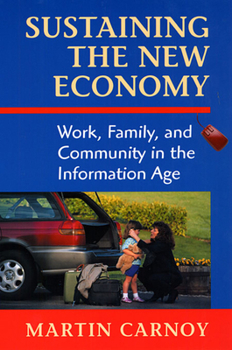Sustaining the New Economy: Work, Family, and Community in the Information Age
Select Format
Select Condition 
Book Overview
This book explores the growing tension between the requirements of employers for a flexible work force and the ability of parents and communities to nurture their children and provide for their health, welfare, and education. Global competition and the spread of information technology are forcing businesses to engage in rapid, worldwide production changes, customized marketing, and just-in-time delivery. They are reorganizing work around decentralized...
Format:Paperback
Language:English
ISBN:067400874X
ISBN13:9780674008748
Release Date:May 2002
Publisher:Harvard University Press
Length:256 Pages
Weight:0.86 lbs.
Dimensions:0.7" x 6.1" x 9.2"
Customer Reviews
3 ratings
How to reproduce human and social capital in the new economy
Published by Thriftbooks.com User , 21 years ago
Martin Carnoy did a great job to organize his own field works and general trends into a seamless fabric. The broad features of new economy is captured by a deft hand with timely insertion of lively facts. Whenever I meet materials on this kind of subject, I cannot but be assured that social sciences are not science but a derivative of literature. They tend to be super-optimistic or ultra-pessimistic. But equipped with well founded conception, Carnoy takes a realistic stance. He shows what should be called social sciencesThe author raises the question: How to sustain current economic expansion? On the face of cut-throat global competition, the workplace could not but be transformed to attain flexibility. With it, firms compete in the new environment. But flexibility indicates disaggregating workers from the social institutions that reproduce human capital and social capital. The author calls for public intervention to establish reintegrating institutions for two reasons:1. Traditional nuclear family and local community have been stressed with mounting pressures from labor market. Those institutions have been the very place where human capital and social capital are reproduced. Human capital and social capital are indispensable to sustain the economic growth. New economy is more vulnerable to such undermining the very infra, society, where the economy is embedded. 2. What is the most distinct in the new economy is knowledge. Knowledge, or human capital, should be reproduced. Now it¡¯s relegated to the individual¡¯s hand. This has devastating effects on social integration. Without some measures, the access to knowledge, skills, and information divide workforce into the dual labor market where winner and loser reproduce themselves for good.
Knowledge communities: means and ends for society's future
Published by Thriftbooks.com User , 23 years ago
Carnoy's analysis of labor data, along with astute personal insights, are his tools for describing a changing world of work, family, and community. He examines tchnology-based workplace changes, as well as trends concerning globalization and the impact of women's role in the labor force and changing family structures. The "cloth" of Carnoy's vision is woven from many emerging trends which affect the way we define community. He concludes that societies might benefit from a shift in power from mega-nationals to innovative local governments, requiring active commitment on the part of citizens, a a redirection from job-centeredness to knowledge-centeredness.
Finally an academic book that makes sense for your life
Published by Thriftbooks.com User , 23 years ago
This book explains the current transformation of employment and work, and the consequences for families and communities. It shows, with an impressive documentation, that flexibility is the norm. The new economy is productive because workers move around and change jobs and activities. But this flexibility may be socially unsustainable, unless we strengthen the family, the community, and the schools. What I really like about this book is that it is a great piece of academic research, yet it is a down to earth, policy oriented book that could help us and our politicians to make the new economy socially sustainable. Required reading for economic and social sciences in colleges. And easy, interesting reading for everybody wanting to understand our new world. Manuel Castells, Berkeley, California.





